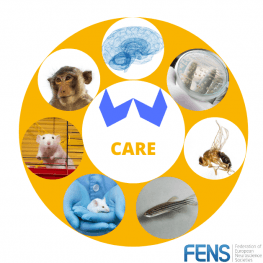Start
July 12, 2020 - 9:30 am
End
July 12, 2020 - 10:30 am
This discussion will cover situations involving shifts from high to low complexity models, animal models to experiments in humans, and animal to in vitro models. Speakers will talk about why they’ve made such changes, the challenges encountered and the impact on their working methods.
In a first presentation, Peter Janssen (KU Leuven, Belgium | CARE Chair 2018-2020) will demonstrate how invasive intracortical recordings in human patients can provide new evidence about the function of the visual cortex, which could not have been obtained with noninvasive measurements. Samuel Solomon (University College London, UK) will present his work on the visual system in rodents, and will explain how these studies can complement experiments in nonhuman primates. Finally, Tara Spires-Jones (University of Edinburgh, UK) will talk about her work on resected human brain tissue and human stem cell derived neurons and microglia when tackling neurodegeneration in Alzheimer’s disease. Together, the three speakers will cover several approaches to find valuable alternatives for experiments in animals, highlighting both opportunities and limitations. Overall, the CARE event aims to improve knowledge about the efforts of the scientific community to replace and reduce the number of animals used in neuroscientific research.
This event is organised by the FENS Committee on Animals in Research (CARE) and will be moderated by Kate Jeffery (University College London, UK | CARE member).
Faculty:
Chair:
Kate Jeffery, UK (CARE Committee Member)
Speakers:
Peter Janssen, Belgium (Chair, CARE Committee)
Samuel Solomon, UK
Tara Spires-Jones, UK


